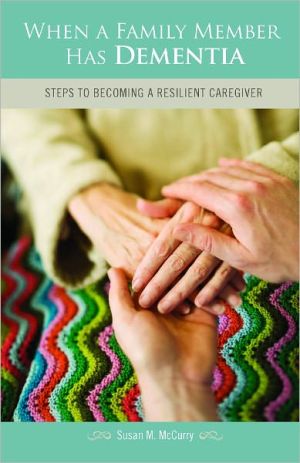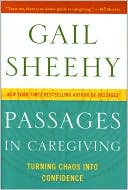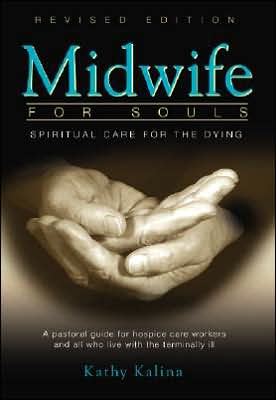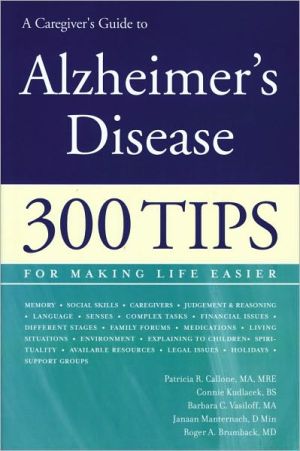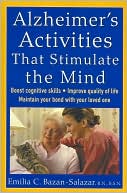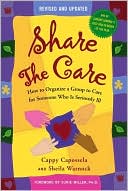When a Family Member Has Dementia: Steps to Becoming a Resilient Caregiver
Caring for a person with dementia is a difficult and often- overwhelming task. In addition to the inevitable decline in memory and physical function, most persons with dementia develop one or more troublesome behavior problems, such as depression, fearfulness, sleep disturbances, paranoia, or physical aggression at some point in their disease. Behavioral challenges in dementia are highly idiosyncratic. No two patients are alike, and interventions that work well with one person are often...
Search in google:
McCurry (psychosocial and community health, U. of Washington) points out that no two people with dementia are alike, and that caregivers must learn to rely on their own creativity and innate resources to help their loved ones. She clearly and honestly describes a number of situations in which caregivers may find themselves and their loved ones, and also shows how caregivers choose to react can affect not only the quality of life for the loved one but also for the caregiver. She gives caregivers tools can use to develop resilience as their loved ones' behaviors change and advises them to practice five core principles: do not argue, accept the disease, nurture yourself, create novel situations, and enjoy the moment. She also provides a list of resources and a bibliography. Annotation © 2006 Book News, Inc., Portland, OR
Foreword by Linda Teri, Ph.D.PrefaceThe Problem: Dementia Caregiving is Hard! Why Resilience MattersThe Program: Learning the Dementia DanceDon't Argue!Accept the DiseaseNurture YourselfCreate Novel SolutionsEnjoy the MomentThe Promise: You can do it!Appendix A. Caregiver ResourcesNotesBibliographyIndex
\ From the Publisher"Although unsettling for a reader who has not been involved with dementia, the book is an authentic and heartening companion for those who are in the midst of providing such care, and for those who are beginning the journey into a dark and bewildering future with someone they love."\ -\ Care Management Journals\ "Susan McCurry's book about the resilient caregiver is a wonderful addition to the literature for people caring for individuals experiencing significant memory deterioration….With respect and compassion, she provides an easy-to-remember set of tools for those who are living with and loving an adult whose memory and self-care capacity are degenerating. McCurry's book is an eloquent and timely example of giving psychology away. It contains a variety of helpful ideas familiar to practicing clinicians in language that makes them accessible to very busy nonpsychologists….McCurry conveys a hopefulness that can encourage people to find the best in themselves and in the people they love, even when those people are no longer able to take responsibility for their part of the relationship. This capacity to give more, coupled with the ability to find joy in the giving, is deeply inspirational to me. I honor and appreciate those caregivers who are making the world a better place for all of us."\ -\ P&T\ "McCurry points out that no two people with dementia are alike, and that caregivers must learn to rely on their own creativity and innate resources to help their loved ones. She clearly and honestly describes a number of situations in which caregivers may find themselves and their loved ones, and also shows how caregivers choose to react can affect not only the quality of life for the loved one but also for the caregiver. She gives caregivers tools they can use to develop resilience as their loved ones' behaviors change and advises them to practice five core principles: do not argue, accept the disease, nurture yourself, create novel situations, and enjoy the moment. She also provides a list of resources and a bibliography."\ -\ SciTech Book News\ "[A]n important and accessible guide for caregivers facing the daunting task of providing support to a loved one with dementia; McCurry's excellent book is filled with practical advice."\ -\ THE SEATTLE POST-INTELLIGENCER\ "[T]he book is a fine guide to a practical philosophy of providing care while maintaining one's own emotional balance."\ -\ PsycCritiques\ "Clinical psychologist McCurry presents a glimpse into the world of persons diagnosed with dementia, or care recipients and their resilient family caregivers. The main audience clearly is family caregivers, and perhaps professionals and practitioners who work with family caregivers or support groups. McCurry labels her program The Dementia Dance or DANCE, an acronym for five core principles for resilient caregivers. In this readable book, the author identifies what she defines as the art of learning resilience and the characteristics of resilient caregivers. Her case studies readily highlight the components of resilience. McCurry provides exercises at the end of chapters to assist caregivers in developing strategies for dealing with the difficulties they face. The book's intended audiences will be able to usefully apply this book. Although faculty in many disciplines could incorporate it in the classroom, its best use will be by professionals or practitioners, along with resilient caregivers, in guiding already-overburdened family caregivers who are experiencing coping challenges. Recommended. Professionals/practitioners; general readers; lower-/upper-level undergraduates."\ -\ Choice\ "[T]eaches caregivers how to take advantage of their own unique inner resources to overcome the special challenges of dementia in a loved one. But it does more than encourage inner resilience: chapters provide specific tips and tools for developing inner resources and strategies, and offer five core principles which link these strategies to life. Vignettes blend with practical tip applications. inner resources and strategies, and offer five core principles which link these strategies to life. Vignettes blend with practical tip applications."\ -\ Midwest Book Review - California Bookwatch\ "If you are a caregiver, you need this book! It may be beneficial for you to have family and friends read it to understand the D.A.N.C.E. principles. This way you will be on the same page when coming up with possible solutions to the many problems faced by caregivers and their patients. I suggest that physicians and other professionals treating Alzheimer's patients have this book in their waiting rooms and on their office shelves. Tell caregivers about it -- it will help them survive this situation without become totally frustrated themselves."\ -\ metapsychology.mentalhelp.net\ \ \
